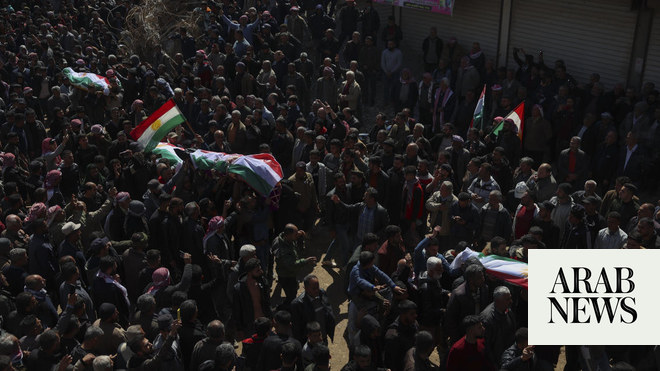
Water disruptions in Hasakah spell more suffering for civilians unless Turkish forces withdraw from NE Syria
Turkey’s stated aim of creating a safe zone along the border now entails cutting off water as a pressure tactic
DUBAI: Near the town of Ras Al-Ain in Hasakah, in northeastern Syria, empty jerry cans were piled high on the roadside, where women and their restless children waited in the blistering heat for trucks to bring water to their parched community. Just a few days earlier, Turkish occupation forces had once again cut off the water supply from the Alouk pumping station, five kilometers away.
This critical facility normally supplies drinking water to nearly 1 million people in Hasakah. Without it, the province goes thirsty.
“We had no water for a month,” recalled Ahmed Zubair, 22, who works at a local phone shop. “Without water, we can’t protect ourselves against the coronavirus disease (COVID-19). This is a reason for the spread of disease, because there’s not enough water for cleaning, only for drinking. This is a danger for children and for society in general.”
Xelil Osman, a local delivery driver, said: “We were delivering water to the people with trucks. The water situation is really bad, and we always worry it won’t be enough for the people. If there is water, we deliver it. But if there is none, we have nothing to deliver.”
It was no accident of fate that water had to be delivered by road to tens of thousands of Kurdish residents in Ras Al-Ain and surrounding areas in Hasakah for nearly four weeks since Aug. 13.
In October last year, Turkey and its Syrian rebel proxies launched their self-proclaimed Operation Peace Spring, targeting the Kurdish-led Syrian Democratic Forces (SDF) in northeastern Syria. The SDF is mostly made up of members of the People’s Protection Units, which Turkey considers a terror group because of its ideological connection to the Kurdistan Workers’ Party, whose armed struggle since 1984 for greater Kurdish rights evolved into an insurgency over time.
The SDF had spearheaded the US-backed coalition campaign against Daesh in northern Syria, destroying the militants’ last holdouts in Deir ez-Zor in March 2019. However, in a “betrayal” that stunned coalition partners and shocked the US foreign-policy establishment, Washington did nothing when Ankara launched a massive assault on the SDF in October 2019, forcing it to withdraw from its positions along the Turkey-Syria border.
Just a few hours into Turkey’s cross-border offensive, artillery shells hit the Alouk pumping station, immediately putting it out of service. Although the facility has since been repaired with international oversight, it remains under Turkish control.
Under the circumstances, the area’s limited water reserves can be exploited at will, regardless of what international humanitarian laws guarding civilian infrastructure say. This puts additional pressure on the Kurdish-led Autonomous Administration of North and East Syria (NES), which currently administers the area also known as Rojava.
A Kurdish boy takes his turn to get his share of water delivered by trucks near the town of Ras Al-Ain in Hasakah, northeastern Syria. (Photo courtesy of Jamal Photography)
“The NES has dug a few water wells as an alternative, but this does not provide enough water,” Wladimir van Wilgenburg, a political analyst and journalist who covers Kurdish affairs, told Arab News. “The only solution is for the international community to put pressure on the Turkish government to stop cutting off water to parts of northern Syria.”
When the taps ran dry in August, the international community began applying pressure on Ankara, but with little success. James Jeffrey, the US special envoy for Syria, reportedly urged the Turkish leadership to resume water supplies, while Russian military engineers in the area set to work on a pipeline to help quench Ras Al-Ain’s thirst.
Russia backs Syrian President Bashar Al-Assad, whose regime is locked in a low-intensity war with Turkish forces in the northwestern province of Idlib and in a three-way contest with the Turks and the SDF over control of northeast Syria.
Russia is keen to win favor with the Kurds to help promote a diplomatic solution to the civil conflict in Syria. Moscow believes the Kurds must be included in constitutional talks with the regime, otherwise a mutually accepted government and a unified country will not be possible.
The stated aim of Ankara’s Operation Peace Spring was to force the SDF back from the Turkish border by creating a self-declared safe zone reaching some 30 kilometers into Syrian territory.
Almost a year on, and with the US now bolstering its Syria deployments with Sentinel radars, additional fighter patrols, and Bradley Fighting Vehicles in its escalating rivalry with Russia, the area remains anything but safe.











